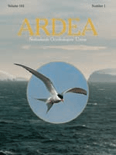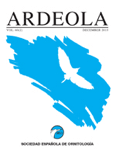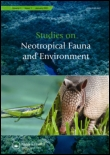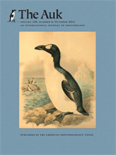
ORNITOLOGIA NEOTROPICAL
Scope & Guideline
Connecting researchers to elevate Neotropical ornithology.
Introduction
Aims and Scopes
- Avian Ecology and Behavior:
The journal emphasizes studies on the ecological roles and behaviors of birds, including feeding ecology, nesting habits, and social interactions, contributing to a deeper understanding of avian life in various ecosystems. - Conservation Biology:
A core aim is to address conservation issues, highlighting the threats faced by bird species and their habitats, and reporting on effective conservation strategies and policies. - Biodiversity and Distribution:
Research focusing on the distribution patterns of bird species, their habitat preferences, and the impact of environmental changes on avian biodiversity is a significant aspect of the journal. - Citizen Science Contributions:
The journal values contributions from citizen science, encouraging public involvement in bird monitoring and data collection, which enhances the understanding of avian populations and behaviors. - Morphological and Genetic Studies:
Studies examining the morphological traits and genetic diversity of bird species are frequently published, providing insights into evolutionary processes and species identification.
Trending and Emerging
- Climate Change Effects on Avifauna:
Research exploring the impacts of climate change on bird populations and their habitats has gained traction, emphasizing the vulnerability of certain species and the need for adaptive conservation strategies. - Behavioral Ecology:
There has been an increase in studies examining specific behavioral patterns, such as anting and mating displays, which enrich our understanding of avian life and its complexities. - Citizen Science and Public Engagement:
The integration of citizen science methodologies into research has risen, reflecting a trend towards collaborative data collection and community involvement in avian monitoring and conservation efforts. - Ecological Interactions and Food Webs:
Emerging research focuses on the interactions between birds and other species within ecosystems, including the role of birds in seed dispersal and their dietary preferences, showcasing the importance of avian roles in ecological networks. - Conservation Genomics:
The application of genomic techniques to conservation biology is becoming more prominent, providing insights into genetic diversity and population structure, which are critical for effective conservation planning.
Declining or Waning
- Traditional Taxonomy:
Research focused solely on traditional taxonomic classifications has decreased, likely due to the growing emphasis on molecular and genetic approaches to species identification and classification. - Urban Bird Studies:
Although urban ecology remains important, studies specifically addressing the impacts of urbanization on bird populations have become less frequent, possibly overshadowed by broader ecological and conservation topics. - Morphological Studies:
While still relevant, there appears to be a waning interest in purely morphological studies of birds without accompanying ecological or genetic analyses, as researchers increasingly seek integrative approaches. - Historical Avian Studies:
Papers focusing on historical accounts or older literature concerning avian species have diminished, as the journal shifts towards contemporary studies that address current ecological and conservation challenges.
Similar Journals

ARDEA
Discovering the intricacies of bird biology and ecology.ARDEA, published by the Nederlandse Ornithologische Unie, is a prominent journal in the fields of Animal Science, Zoology, and Ecology. With its rich history spanning from 1981 to the present, ARDEA serves as a vital platform for researchers and professionals dedicated to avian studies and the ecological sciences. This quarterly journal is recognized in the Q3 category for both Animal Science and Ecology, as per the latest rankings, and maintains an impressive global standing within its subject areas. Although it operates without an open access model, the journal provides significant insights and contributions to the understanding of bird biology, conservation, and evolution. Researchers and students seeking to advance their knowledge in ornithology and related fields will find ARDEA to be an indispensable resource, promoting high-quality research and fostering academic collaboration.

Avian Biology Research
Pioneering insights into avian ecology and behavior.Avian Biology Research, published by SAGE PUBLICATIONS LTD, is a leading journal dedicated to advancing the study of avian species through high-quality, peer-reviewed research. With an ISSN of 1758-1559 and an E-ISSN of 1758-1567, this journal has established itself as a vital resource within the fields of Animal Science and Zoology, as well as Ecology, Evolution, Behavior, and Systematics. The journal is currently ranked Q3 in both categories according to the 2023 release of the category quartiles, and it contributes significantly to the global understanding of avian biology, including behavior, physiology, and conservation efforts. Positioned within the competitive landscape of the Scopus rankings, it finds itself amidst a diverse array of research, with medical and environmental implications. As an open-access journal, Avian Biology Research ensures greater accessibility to its contents, fostering disseminative opportunities for researchers, professionals, and students alike. With a publication window spanning from 2008 to 2024, it continues to be an invaluable platform for the dissemination and dialogue of avian research, thereby enlightening future inquiries and driving scientific advancements in this crucial area of biology.

Avian Conservation and Ecology
Advancing avian science for a sustainable future.Avian Conservation and Ecology, published by the Resilience Alliance, is a premier open-access journal dedicated to advancing the scientific understanding and management of avian populations and their ecosystems. With an ISSN of 1712-6568, this journal has been a vital resource since its inception in 2005, ensuring that research findings are readily accessible to the global community. Based in Canada, it covers a diverse array of topics within the realms of Animal Science, Zoology, Ecology, and Conservation. Recognized for its rigor, it boasts a distinguished Q1 ranking in Animal Science and Zoology, and maintains respectable positions in various ecological categories as of 2023. Researchers and students alike will find valuable insights and innovative studies that address key conservation challenges, reflecting the journal's commitment to fostering ecological resilience and informing policy-making. As a platform that champions open access, Avian Conservation and Ecology plays a crucial role in enhancing collaboration and communication among scientists, policy-makers, and the public。

Ardeola-International Journal of Ornithology
Exploring the Wings of KnowledgeArdeola - International Journal of Ornithology, published by the SOCIEDAD ESPAÑOLA DE ORNITOLOGÍA, serves as a vital platform for the dissemination of research in the field of avian studies. With a history dating back to 1980, this esteemed journal has cultivated a reputation for high-quality research, achieving a notable Q2 category ranking in Animal Science and Zoology as well as in Ecology, Evolution, Behavior, and Systematics as of 2023. While primarily based in Spain, Ardeola caters to a global audience, providing essential insights into ornithology through rigorously peer-reviewed articles. The journal does not currently operate under an open-access model, which underscores the significance of institutional subscriptions and the importance of supporting academic publishing. Researchers, professionals, and students engaged in avian ecology will find Ardeola indispensable for accessing impactful studies that advance our understanding of bird populations, behaviors, and conservation issues. With its accessibility and continuing commitment to excellence, Ardeola plays a crucial role in fostering knowledge and promoting dialogue in the ornithological community.

Neotropical Biodiversity
Championing biodiversity for a sustainable tomorrow.Neotropical Biodiversity is a prominent journal dedicated to advancing our understanding of biodiversity and ecological dynamics within the Neotropical region. Published by TAYLOR & FRANCIS LTD in the United Kingdom, this Open Access journal has been providing unrestricted access to research findings since 2015, fostering collaboration and knowledge sharing among the global scientific community. With an emphasis on innovative research in Ecology, Ecology, Evolution, Behavior and Systematics, and Global and Planetary Change, it has earned a reputation for excellence, currently holding a Q3 category in its field. As of 2023, the journal ranks in the 37th percentile for Environmental Science (Ecology) and in the 36th percentile for Agricultural and Biological Sciences (Ecology, Evolution, Behavior and Systematics), making it a valuable resource for researchers, professionals, and students interested in understanding and preserving biodiversity in one of the world's most diverse ecosystems. We invite you to explore the cutting-edge research published in Neotropical Biodiversity and contribute to the ongoing dialogue for environmental sustainability and ecological resilience.

NOTORNIS
Exploring the intricacies of birdlife and ecology.NOTORNIS is a prestigious academic journal published by the Ornithological Society of New Zealand, dedicated to advancing the field of ornithology and contributing meaningful research related to avian species. With ISSN 0029-4470 and E-ISSN 1177-7680, this journal has been a vital resource for scholars since its inception in 1982, continuously fostering discourse within the scientific community, particularly in the realms of animal science and zoology. Though it currently holds a quartile ranking of Q4, with a Scopus rank of #250 out of 490 in its category, NOTORNIS occupies a unique niche in ornithological research, promoting studies that highlight the ecological and biological intricacies of birds. This journal is critical not only to researchers and professionals in zoology but also to students and educators aiming to engage with contemporary avian research. As New Zealand's leading ornithological publication, NOTORNIS underscores the importance of avifaunal studies in conserving biodiversity and understanding ecological dynamics.

Avian Research
Championing biodiversity through cutting-edge ornithological research.Avian Research is a premier, open-access journal dedicated to advancing the field of ornithology and avian studies. Published by KEAI PUBLISHING LTD since 2014, this journal aims to disseminate high-quality research covering a broad spectrum of topics related to bird biology, ecology, behavior, and conservation. With its impactful presence, rated as Q1 in Animal Science and Zoology and Q2 in Ecology, Evolution, Behavior and Systematics for 2023, Avian Research stands out as a pivotal resource for researchers, professionals, and students alike. The journal's dedication to open access ensures that valuable findings are readily available to a global audience, fostering collaboration and innovation within the scientific community. Located in Beijing, China, Avian Research invites contributions that advance our understanding of avian species and their environments, playing a critical role in promoting biodiversity and sustainable practices in avian conservation.

STUDIES ON NEOTROPICAL FAUNA AND ENVIRONMENT
Bridging Theory and Practice in Animal Science and EcologySTUDIES ON NEOTROPICAL FAUNA AND ENVIRONMENT is a distinguished academic journal published by Taylor & Francis Ltd, dedicated to advancing the fields of Animal Science, Zoology, and Ecology. With an ISSN of 0165-0521 and an E-ISSN of 1744-5140, this journal has been a significant outlet for scholarly research since its inception in 1976, continuing to provide critical insights into neotropical biodiversity and the environmental intricacies of this rich ecological region through 2024. Recognized in the Q3 category for both Animal Science and Ecology, the journal ranks at #232/490 in Animal Science and Zoology and #402/721 in Ecology, marking it as a valuable resource for researchers, professionals, and students interested in ecological and zoological studies. By offering a platform for innovative research and comprehensive reviews, the journal aims to bridge the gap between theory and practical application, facilitating a deeper understanding of the unique challenges and conservation strategies relevant to neotropical ecosystems. Although not an open-access journal, it plays a crucial role in fostering academic discourse and knowledge dissemination in its field, ensuring that critical advancements in understanding neotropical fauna and environmental dynamics reach a diverse and engaged audience.

Ornithology Research
Pioneering Discoveries in Ecology and Avian ConservationOrnithology Research is a leading academic journal published by SPRINGERNATURE, specializing in the field of avian studies and contributing to the broader category of Animal Science and Zoology. With a respectable Q2 ranking in its field as of 2023, this journal provides a dynamic platform for the dissemination of innovative research findings related to ornithology, ecology, and conservation. The journal, which transitioned to an Open Access model, ensures that its research is accessible to a global audience, fostering collaboration and knowledge sharing across disciplines. With an E-ISSN of 2662-673X, Ornithology Research serves the needs of researchers, professionals, and students dedicated to understanding the complexities of avian life. Its commitment to high-impact, peer-reviewed articles makes it an essential resource for anyone interested in advancing the science of ornithology.

Ornithology
Unveiling the Secrets of Bird Biology.Ornithology, published by Oxford University Press Inc, is a premier journal dedicated to the field of avian biology, offering a platform for researchers, professionals, and students to share groundbreaking findings in the study of birds. With an impressive impact factor and ranking in the Q1 quartile for both Animal Science and Zoology, as well as Ecology, Evolution, Behavior, and Systematics, Ornithology serves as a vital resource for advancing our understanding of avian species and their ecological roles. The journal allows open access viewing, broadening the reach and impact of published research. Covering comprehensive studies from 1982 to 2023, it facilitates collaboration and innovation within the global ornithological community. Engaging with Ornithology not only elevates your research profile but also contributes to the rich tapestry of knowledge concerning the world's diverse bird populations.